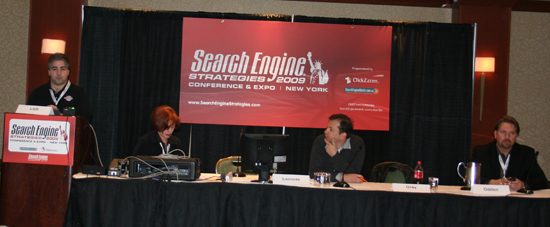Time to jump into some sessions!
We’re finally talking about something I have a clue about — Blogs! Yey, blogs. Blogs are wonderful. They’re like donuts. And coffee in the morning. And functioning Blackberries. Rebecca Lieb is moderating with speakers Michael Gray, Lee Odden and Michel Leconte.
Ready? Hold on because Michael Gray is up first and he’s speaking even faster than normal.

SEO Through Blogs and Feeds – Photo used with permission by SearchCowboys.com
Don’t write blog titles that suck. Bad titles lack keyword focus and are often meant to be clever or amusing. Good blog titles have keyword focus and include phrases that people would type into a search engine. When you use the right title, all of your internal anchor text will use those words. The titles with often be your external anchor text, as well.
Partial feeds suck. Michael calls it being half-dressed at a party. Full feeds allow you to use Web scrapers to build links for you. You want to be scraped because you want people linking to you with your good keyword-rich title. He ranks first for [seo blog] just based off those scrapers. Put links inside your post, to any page on your Web site, even commercial pages. Scrapers will link to them. They’re not high quality links, but they add up. There are number of advertising solutions for text and banner ads that go inside feeds and aren’t blocked. Advertising concern is no longer an excuse for why you’re using partial feeds. When you go with full feeds, you improve usability by enabling offline or mobile browsing access to your content.
Use your blog to build up domain authority. How do you do that? Put your blog on a subdomain or subfolder on your domain. That lets you build trust and authority on your domain instead of splitting up the link equity. Subfolders are much better at consolidating link equity but have technical implemetnation issues and security concerns. [mmm, wordpress hacks]
Stand out! You want your blog to stand out and to be link worthy. Don’t blog just for the sake of blogging. Blog at whatever frequency allows you to be exceptional. [I love that rule.] Have an opinion with your blog. Be serious. Be funny. Be politically incorrect. Be a moral compass. Just be something. A blog which you set up to build links and isn’t generating any is useless.
Just because you have a blog doesn’t mean people are going to come. This is not Field of Dreams. Great writing without shameless self promotion is like locking Shakespeare in your basement. If you want people to read you, link to you or bookmark you, tell their friends about you, you have to work it, sometimes beforehand. Get involved in the community. Make sure the bigger blogs know you exist by leaving comments. It make take awhile.
Bringing it Together.
Which do you want: An unexpectional blog post every day that few peole will read that isn’t link worthy in any way OR an expectional blog post with a unique viewpoint that people want to read? That’s what you want to have.
Next up is Lee Odden.
[I think Rebecca just said Lee works for High Rankings. Um, that’s Jill Whalen. Lee owns Top Rank Marketing. Almost the same.]
The Top Rank blog has brought in 700,000 inbould links. They get 50-300 getting new links daily. They spend less than 4 hours a month soliciting links.
Eight Blog Link Tips
- Tell your friends: Give them a reason why they should link to you and read your blog. Tell them your goals. (Goals in blogging, not life. No one cares about your life goals except your mother. And really, she’s giving up hope, too.)
- Link out: Play on bloggers narcissism.
- Create a Big List: He talks about his search marketing blogs BigList, which is AWESOME.
- Get on “other” lists: Make comments. Get on people’s radar. Once you get on one list, if you publicize it, you’ll likely get on another.
- Make a killer tool.
- Run a contest or poll and include a badge link.
- Get syndicated: If you get syndicated on more authoritative blogs, they’ll rank for your keywords instead of you. Lee recommends getting syndicated for awhile and then turning it off.
- Network OFFLINE: Print your blog address everywhere you print your site address. Talk about your blog.
Bonus Tip: Embed links in your RSS feed. It helps with syndicators and scrapers to link back to the original post.
Takeaways:
- Give blogs a reason to link to you.
- Remember the golden rule.
- Don’t obsess, focus on value: Being useful is one of the best pieces of advice you can get.
- Quality is better than quantity
Next up is Michel. He has a seriously heavy (read:sexy) accent. This should be fun.
RSS pushes out new pieces of information. Instead of crawling Web sites for any kind of information, RSS feeds give bits of information that is useful to the search engines. It’s like having your spouse takr your jackry out of the closet as opposed to you looking for it yourself. [Um. Okay?]
Write content, aggregate, repurpose, distribute. Your RSS feed is a direct communicatioin channel to your audience. You can gain traffic and juice from deep links.
How To?
- Distribute Broadly
- Format: Both full text and snippets
- Content: news/latest comments
- Dice it: by categories and interest, but don’t go overbaord.
- Make it Easy: Use one click subscription, email subscription, the auto discovery tag, RSS directories and Google Base.
- SEO the Feed: Add deep links within the content/footer/header.
- Track: 301 redirect/mybrand setup in Feedburn or analytics IMG bug.
Tools
- RSS Feed Footer (from Joost)
- Pingomatic
- 55 RSS Directories: www.dotsauce.com
- Twitterfeed.com
Question and Answer
How do you match blogging with business needs?
Michel: It all depends on whether or not you’re posting with a purpose. If you’re trying to get recognition, then a full feed would be the way to go in order to drive traffic back to the site. There should be a purpose behind all of your articles. [Crap. I’ve been doing this wrong for YEARS!]
Michael: You want to give content in the RSS. You don’t need to drive people to your site. People have banner blindness. They don’t even look at the advertising on your site. Lots of people surf with ad blockers, so people aren’t even seeing the ads anyway. You can put ads in the RSS feed. You can bring them to other posts. The ads work better in RSS, so he thinks full feeds are the way to go 95 percent of the time.
Lee: He’s seen very good results with text ads in the RSS feed.
What about links? How important is it to really embed a link in super relevant text as opposed to “click here”?
Lee: You want keywords in the title of blog post because you’ll get link gain from that. You want keyword-rich text in the internal links in your post, as well.
Michael: If there’s someone you have to link to who you don’t want to link to, you can use suboptimal anchor text. Hee.
How valuable is it to add a link to your site or your comment?
Lee: A lot of comments are nofollowed so I wouldn’t put links in a comment thinking its going to get direct SEO value. Do it to be useful.
Michael: When you link to a comment, the search engines view that as an anchor link so they’re not going to parse beyond the numbers.
How do we find out what feeds certain sites are pulling from? How do you help clients identify where to be relative to their target audience?
Lee: Sometimes its a matter of discovery from a bot standpoint. Getting included there either through being associated with others who are already there or from a social standpoint. It’s just like looking at News Search results. Who’s getting included there? What trusted news sources are there? Same thing with news sites. Who are they? Where are they?
Michel: You need to be insync with the news cycle.
Michael: They go through the social sites looking to see who’s getting submitted there. They’ll also reach out to people who submit news for a certain vertical. You can learn about your vertical by going to AllTop.
Do you feed your headlines through Twitter? Any SEO benefit there?
Michael: If you play with the length of your domain so you can it in the full domain without it breaking…that’s the way to go.
Michel: Twitter is the newsroom because that’s where the conversation is happening.
Lets go into the new URL universe, sites like TinyURL. What’s that doing to links?
Michael: Google is looking at that toolbar data so you definitely get benefit from it. You’re feeding the data borg. If you have 300 people retweeting you during the day, that’s helping.
Lee: He wrote a post about this recently called 11 Best URL Shortening Services. I recommend you go there. It’s a great post. [I failed to be able to re-find it. If someone can post it in the comments, we’ll love you forever.] Thanks, Susan!
[Can we STOP talking about Twitter? This is a blog panel. On BLOGGING. Not TWITTER]
What are your thoughts on having someone write the blog content for you?
Michael: The problem is you’re not going to build loyalty with a ghostwriter. If you’re looking to just fill the blog, okay. But you’re not going to get the maximum benefit. There won’t be any interaction. It won’t ever be the best blog. The best blog is something that someone cares about.
Lee: Agreed. You may as well just be publishing articles. That’s not a blog, really. The blogs that have impact and solve problems are the blogs that have personality and interaction. You can hire a person to be the voice.
Can you explain why having your blog on a subdomain is more powerful than Blogger?
Michael: You’re hoping to use your blog to gain links. If you’re blog is sitting on your domain, you’re building your domain and authority and trust. When you blog on Blogger, you’re building trust for them. Subdomains are treated a little differently so there is some sharing. If you can do it on a subfolder, that works best. If you can’t isolate your WP install, you run the risk of someone hacking in and getting their hands on their data.
How do you stay motivated with your blog? How do you prevent the steam from running off?
Michael: The problem is that most blogs write their good content in the beginning when its just them and their mother reading it [hee]. You can write the good content then, but schedule them to go out later. Have a few blogs out before you start commenting on other blogs and interacting with the community. Once you’ve done that, do some ego stroking. People love that. Create an editorial calendar. Look at the holidays that are important to your industry. What events are happening in your industry? Create your calendar early.
Michel: Bloggers tend to be people who socialize really well. [He means online. Offline we bite.] Send them out and let them network in social media.
Rebecca: You need a content strategy. If you’ve got a Web site, you need to start thinking like a Web publisher. You need to start thinking like one. Come up with regular features to keep people engaged and to manage expectations.


